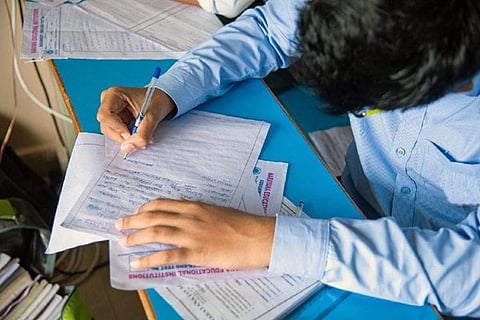

The ongoing exams that students under Karnataka’s Vishweshwaraiah Technological University face are proving to be a source of agony for them. While the exams for final year students were completed in February, while for first year students they are scheduled to begin on April 19 and end on May 3. The students complain that there is not enough of a gap between each paper. Added to this, the schedule of online classes across colleges was varied, with some starting earlier than others. As a result, the amount of the syllabus completed in each institution also differs greatly, with some portions being rushed or left incomplete entirely.
“Our entire subject is to learn how to code. Each step and code has to be explained for us to understand. But our professors simply share a PDF document on it and just read from it. Many times, whole chapters were completed in one single hour. Is it practical to learn like this?” asks Shamant*, a computer science engineering student from the University Vishweshwaraiah College of Engineering, Bengaluru.
Though some colleges in Bengaluru started to hold physical classes by the end of December, students felt that the measure was inadequate, as the difficult practical and theory portions were already completed and were not discussed in the physical classes. “In a class, the lecturer would write a sum on the board and explain step by step how to solve it, and we would repeat it in our notebooks. But now all they can do is screen share a pre-solved PDF file and then just read out the process. We haven't been able to understand through this,” says Aishwarya S, a third-year student of Electronic and Communication Engineering at the Sri Krishnarajendra Silver Jubilee Technological Institute, Bengaluru.
All the students that TNM spoke to were of the opinion that there should have been at least one month of physical classes ahead of the exams, in order to grasp the subjects. Several student forums and lecturers also expressed a similar view.
“It is a genuine difficulty they face. These subjects have to be taught with live interaction, if not it becomes very hard to learn. The VTU need not have stuck so rigidly to maintaining their term periods. They could have done proper offline classes to finish all these and then declared exams,” shares a Mechanical Engineering lecturer from Bengaluru who did not wish to be named.
“Having lived through a pandemic, what would be the psychological condition of the students? Was that ever considered when they made decisions?” questions Kalyan, the Co-Convenor of Ignite, a forum for engineering students. He adds that all stakeholders including students, parents and academicians should have been consulted in decisions regarding physical classes.
Several third-year students feel that, though their exams are over, feel that the VTU can do better for the next semester. Another measure that could be a relief for students is doing away with year-backs (wherein backlogs must be cleared the following year) and critical back-logs (where one must not have any pending backlogs to proceed to the next year), they feel.
Another batch of students who are facing difficulties is the diploma students, who join directly in the second year. This year has been especially difficult for them as, though online classes began in most colleges in September, their seats were allocated only by the end of December. Due to this, the students missed a chunk of the syllabus.
Concerns about the quality of online education are also on the minds of students and lecturers. “Before the pandemic, the normal college atmosphere along with theory and practicals would allow the student to understand. Not just classes, things like them talking among their friends or meeting lecturers after classes to get doubts cleared would have been very beneficial. Now this year, when things were so different, how can the officials sitting in their chambers conduct classes and exams without addressing these issues. This will result in engineers of very poor quality,” shares Rajesh Bhat, Secretariat member of Save Education Committee, Karnataka.
Lecturers were affected during the academic year as well. While some aged professors found it difficult to adapt to technology, several felt that they were not able to teach as efficiently as they would have in physical classes.
“Our lecturer is very good and when he taught before the lockdown, we understood everything. Online, he himself faced several network issues and despite his best efforts he could not make us understand,” says Sriraj Deshpande*, a third-year Mechanical Engineering student from Bellary.